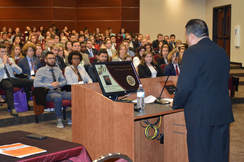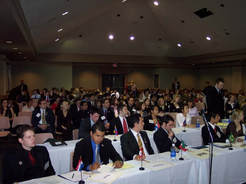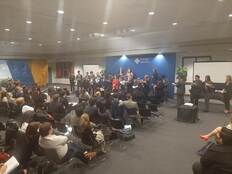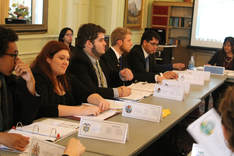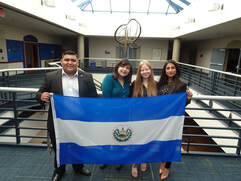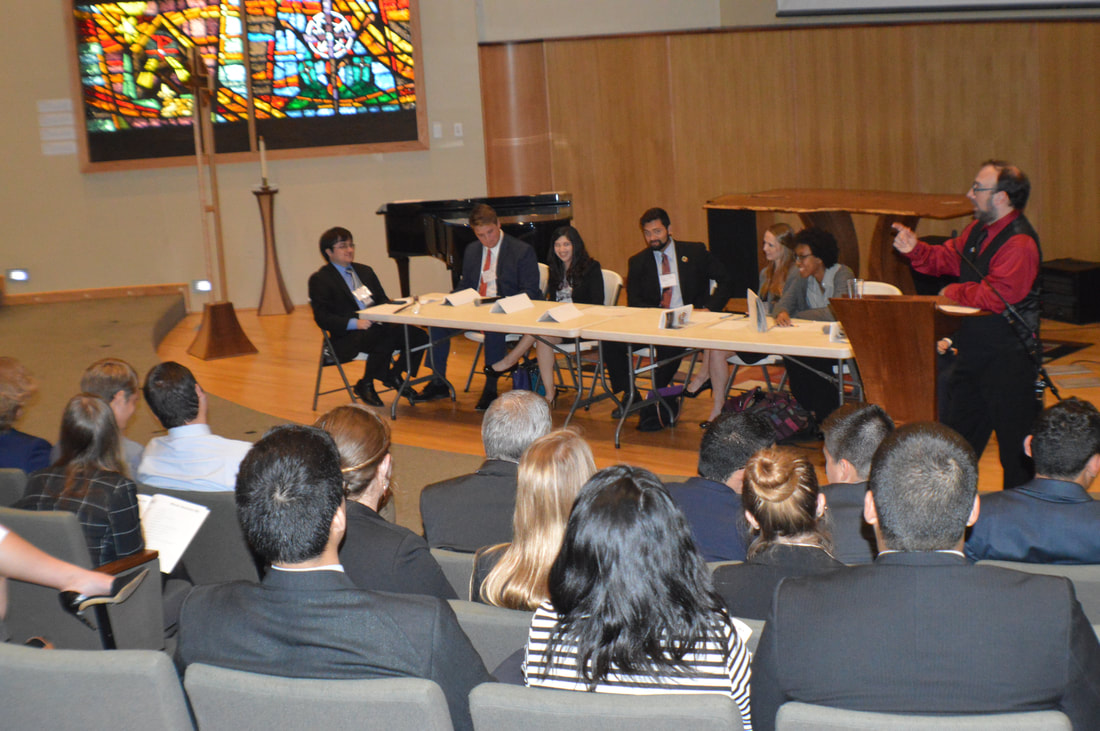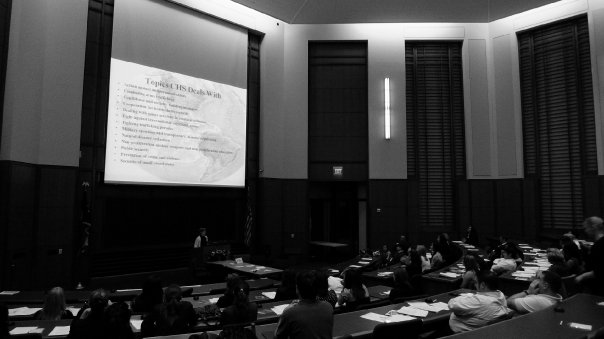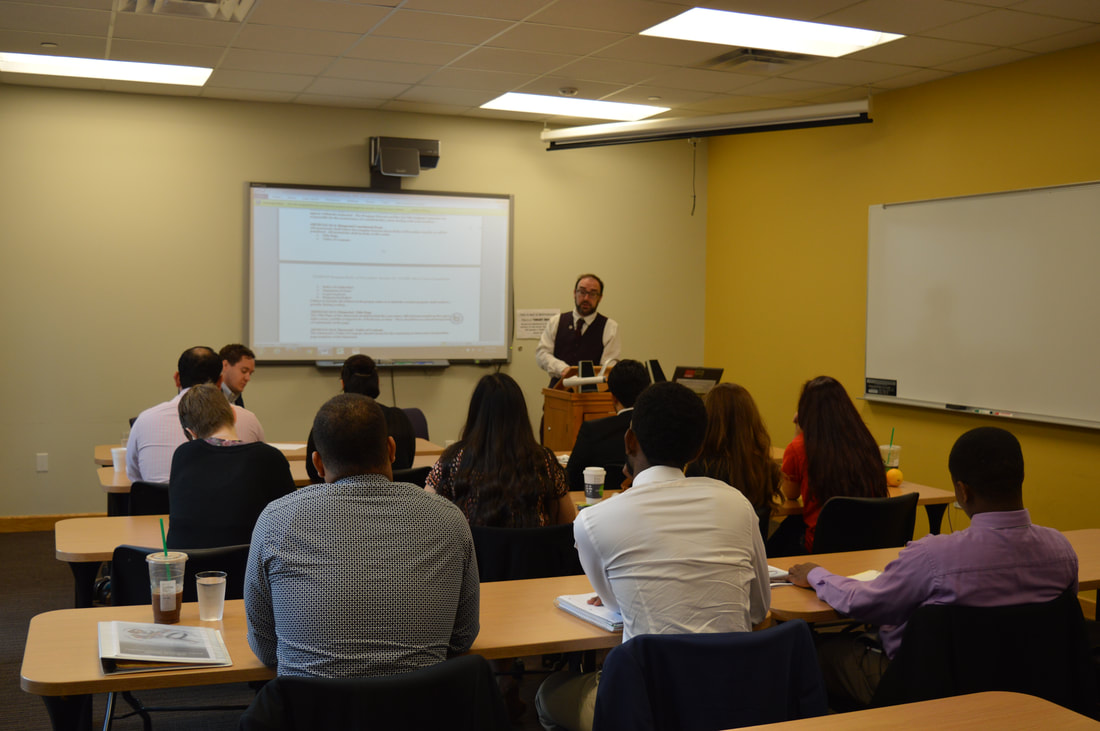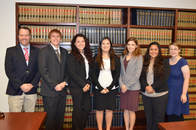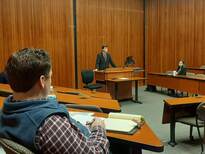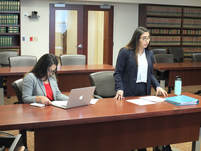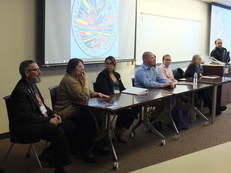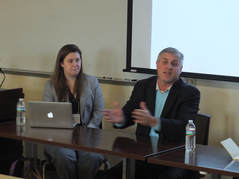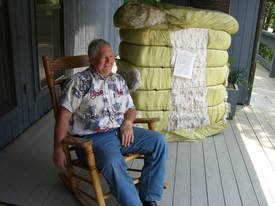Welcome to the ESMOAS Program
What is the ESMOAS Organization?
|
In short, the ESMOAS is an academically-centered program with over 25 years of history bringing the nation's best and brightest college students together to debate the issues facing the Western Hemisphere (North, Central, and South America with the Caribbean). Our organization puts the academic integrity of our workshop and competition at the highest priority, and our many volunteers work diligently to ensure the program is distinguished by its focus on students and their growth as leaders. As such, we our proud of our unique student alumni network--past ESMOAS participants are actively recruited and utilized as volunteers, judges, and support staff. This helps them to build their young resumes and curriculum vitae, while allowing us the privilege of experienced, well-informed staff members to help maintain our meetings and competitions. Their involvement also helps keep our costs low enough to encourage participation of institutions at all levels, both public and private. The ESMOAS program is an immersive program governed by the "academically-centered, students first" model at all times.
|
How do the ESMOAS Conference and Competition Work?
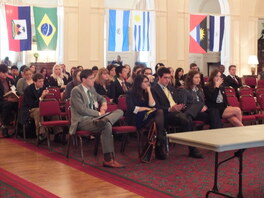
Our annual conference, held in early November at rotating host universities, is made up of three separate events that run concurrently and are scheduled such that a student participating in one aspect has the opportunity to observe the other two portions during break times. The components are run centrally through the ESMOAS Program Office, but are judged and moderated completely separately as standalone events or competitions. Universities can participate in just one component, or can opt in for 2 or all 3.
|
THE COLLEGIATE SUMMIT OF THE AMERICAS
The Eugene Scassa Mock OAS Conference incorporates several facets to be the nation's only "hybrid model conference". Our longest-running portion, the Collegiate Summit of the Americas, has been held since 1995 and is a summit and competition using the same basic style as the Model United Nations, but simulating meetings of the Organization of American States and the Summit of the Americas meetings rather than the UN General Assembly. Before our annual conference, teams are randomly assigned a country within the Organization of American States (this essentially includes every country in the Western Hemisphere). Team members present resolutions on pre-determined topics in various committees, all representing the interests of the country to which they were assigned. Head delegates (selected by each participating team) attend as the actual heads of state of each participating country. The teams and individuals are judged by the quality of their written work, their creativity, public speaking and debate ability, grasp of parliamentary rules and procedures, and, most of all, their ability to hold to their country's agenda and real-life political position. The Summit of the Americas is open to teams representing any two or four year institution, at the undergraduate or graduate level (teams are judged on different levels).
|
|
THE PARLIAMENTARY PROCEDURES WORKSHOP
Upon registration for any competitive portion of the ESMOAS Conference (Summit or IACHR Moot Court), your school will be given access to its own school-exclusive website within www.esmoas.org. This password-protected page will provide instructional videos, downloadable templates, style guides, and instructions for the written components, a parliamentary procedure training and guidebook that teaches the basics of parliamentary debate, making motions, voting, and running a committee. Additionally, the short training videos produced by alumni and members of our program staff and judging committee, can be used in classes or meetings and reviewed in conjunction with your own syllabus or meeting schedule. This is provided as part of the team registration fee.
Additionally, (for a nominal per-student fee and at your own travel/lodging expense), we host an in-person ESMOAS Annual Scrimmage and Networking Workshop, in which participants are provided practice materials and are guided through a practice debate in the parliamentary format they will be using at the conference. Members of the program staff and judging committee will be on hand to offer constructive criticism, suggestions, and tips. To keep things equitable, no parliamentary debate training will be performed here--this activity is for practice, feedback, and networking purposes only. |
|
IACHR MOOT COURT COMPETITION
|
|
The judicial component of the conference is the Inter-American Court of Human Rights Moot Court Competition (IACHR Moot Court). In this competition, students participate as a two-person team. All participants are given a hypothetical case, written by experts in the field and adapted from a real-life case or human rights issue pertinent to the Inter-American Court of Human Rights. Each two-member team then writes a legal argument, or "memorial" (one for the state, one for the petitioner), using case law and legal writing technique to represent his/her side of the case. Teams are judged on the merits of their written cases and then, at the ESMOAS Conference in November, compete one-on-one with other participants in front of a panel of judges through a round of oral arguments. Students at the IACHR Moot Court Competition have the opportunity then to be awarded for either their written or their oral work. Teams are seeded into a single-elimination tournament on the final day. The best two teams compete at the close of the conference, with all conference participants (even those outside the IACHR portion) in attendance. The IACHR Moot Court Competition is open to students at the undergraduate, graduate, or law school level, and these levels are judged separately.
|
|
ESMOAS ACADEMIC CONFERENCE
|
|
Every 3-5 years, in conjunction with the annual ESMOAS Conference in November, the program also administers a traditional Academic Conference on International Relations and Latin America . This meeting is preceded by a call for papers. Students, graduate students, and faculty are encouraged to come present their academic research papers on wide-ranging topics centered on international relations or Latin American studies, and are divided into panels open to the attendance of all conference participants.
The concurrent events at the same conference provide multifaceted academic opportunities for anyone in attendance, and a unique environment for total immersion in the world of Inter-American relations, culture, and history. |
History of the ESMOAS Program
|
|
The first Model Organization of American States (MOAS) General Assembly began in Washington, D.C. in 1980 as a joint project between the OAS and Georgetown University, with the goal of educating U.S. university students on issues related to the Americas. The program was, and remains, very successful, resulting in a decision by the OAS to expand the model to high schools in Washington, D.C. The first model's success, and the success of the later high school model, was also noticed beyond the east coast.
|
Recognizing the potential of the program as a way to teach college students the art of diplomacy and to provide a much-needed "hands-on" study of Latin America, Ambassador Eugene Scassa initiated a regional model OAS in San Antonio, Texas in 1995. Thanks to the support of the World Affairs Council of San Antonio, Saint Mary's University, Trinity University, and Baylor University, the program enjoyed great success in San Antonio, becoming the first collegiate-level conference to perform a simulation of the OAS outside the D.C. area. Over subsequent years, other universities, as well as corporate sponsors like Valero Energy, have participated and played key roles in sustaining this important educational opportunity. The program, though not affiliated directly with the OAS or the original MOAS, was nonetheless recognized in Washington and has enjoyed a cordial relationship with the OAS itself, culminating in the appearance of Secretary General Jose Miguel Insulza as the guest speaker for the annual San Antonio convention in 2009, and Assistant Secretary General Nestor Mendez's keynote speech at the opening of the 20th conference in 2016 in San Marcos.
Since 1995, nearly three thousand students have participated in the program, and it has been hosted by various institutions in Texas. The program is administered by: a volunteer Steering Committee comprised of participating faculty; an advisory Student Steering Committee made up of student participants, a Program Director acting at the behest of the committee to administer the workshop, convention, and program; and a network of passionate volunteers, most of whom are alumni of the program. The organization maintains a small budget and strives to keep costs low for its participating institutions--one of the many ways the Steering Committee adheres to its "academically driven, students first" philosophy.
In addition to the conference itself, institutions across the region have hosted an annual Parliamentary Procedures Workshop designed to help new students acclimate to the rules and procedures involved in the program and conference. It was decided by the Steering Committee to begin rotating the host duties for the workshop every two years. Workshops have been hosted at several universities, including the Universidad de Monterrey, Saint Mary's University, Universidad Regiomontana, Texas State University, Baylor University, the University of Louisiana, and Concordia University Texas.
After a long and successful tenure in the San Antonio area, particularly at Saint Mary's University, the Steering Committee voted to begin a similar process of rotating hosting duties for the convention as well. In 2012-2014, Baylor University acted as host, with other institutions planning to host conventions on a two-year tenure basis afterwards. In 2015, the University of Louisiana at Lafayette became the first institution outside Texas to host the ESMOAS Conference. Beginning in 2012, the program was officially named the Eugene Scassa Mock Organization of American States (ESMOAS). The first conference under the ESMOAS name was also the first to be hosted outside of San Antonio. Texas State University in San Marcos hosted from 2016 to 2018. The conference returned to St. Mary's University and was held there through 2021, culminating in the 25th anniversary ESMOAS Conference and a reception for alumni named to the ESMOAS All-Decade Team. In 2022, the conference returned to Waco, Texas, with Baylor University hosting for the first time in 8 years. For the first time ever, Angelo State University served as host of the ESMOAS Annual Scrimmage (formerly Parliamentary Procedures Workshop), and again in 2023. After its final year in Waco in 2024, the Summit will move to Houston for the first time ever in 2025, at the University of St. Thomas. Beginning this year, 2024, Our Lady of the Lake University in San Antonio will host the parliamentary workshop for the first time, and in the spring of 2025, the IACHR Moot Court Competition will move to St. Mary's University in San Antonio..
Since 1995, nearly three thousand students have participated in the program, and it has been hosted by various institutions in Texas. The program is administered by: a volunteer Steering Committee comprised of participating faculty; an advisory Student Steering Committee made up of student participants, a Program Director acting at the behest of the committee to administer the workshop, convention, and program; and a network of passionate volunteers, most of whom are alumni of the program. The organization maintains a small budget and strives to keep costs low for its participating institutions--one of the many ways the Steering Committee adheres to its "academically driven, students first" philosophy.
In addition to the conference itself, institutions across the region have hosted an annual Parliamentary Procedures Workshop designed to help new students acclimate to the rules and procedures involved in the program and conference. It was decided by the Steering Committee to begin rotating the host duties for the workshop every two years. Workshops have been hosted at several universities, including the Universidad de Monterrey, Saint Mary's University, Universidad Regiomontana, Texas State University, Baylor University, the University of Louisiana, and Concordia University Texas.
After a long and successful tenure in the San Antonio area, particularly at Saint Mary's University, the Steering Committee voted to begin a similar process of rotating hosting duties for the convention as well. In 2012-2014, Baylor University acted as host, with other institutions planning to host conventions on a two-year tenure basis afterwards. In 2015, the University of Louisiana at Lafayette became the first institution outside Texas to host the ESMOAS Conference. Beginning in 2012, the program was officially named the Eugene Scassa Mock Organization of American States (ESMOAS). The first conference under the ESMOAS name was also the first to be hosted outside of San Antonio. Texas State University in San Marcos hosted from 2016 to 2018. The conference returned to St. Mary's University and was held there through 2021, culminating in the 25th anniversary ESMOAS Conference and a reception for alumni named to the ESMOAS All-Decade Team. In 2022, the conference returned to Waco, Texas, with Baylor University hosting for the first time in 8 years. For the first time ever, Angelo State University served as host of the ESMOAS Annual Scrimmage (formerly Parliamentary Procedures Workshop), and again in 2023. After its final year in Waco in 2024, the Summit will move to Houston for the first time ever in 2025, at the University of St. Thomas. Beginning this year, 2024, Our Lady of the Lake University in San Antonio will host the parliamentary workshop for the first time, and in the spring of 2025, the IACHR Moot Court Competition will move to St. Mary's University in San Antonio..
Ambassador Eugene Scassa
|
Our program's founder, Eugene Scassa, served as the Ambassador-in-Residence at Saint Mary's University in San Antonio, Texas from 1994-2000 and 2006-2012. After a distinctive career in the U.S. Foreign Service under the Department of State, including service as the U.S. Ambassador to Belize, as the Executive Director of the Bureau for Inter-American Affairs, and as the Assistant to U.N. Ambassador Madeleine Albright. Ambassador Scassa began the ESMOAS (then called the San Antonio Model OAS) in 1995. Until his death on March 22, 2012, he served as an active participant in the planning and execution of the program, and holds an honorary permanent seat on the ESMOAS Steering Committee. The program was named for him in 2011 in recognition of his passion and hard work as a teacher, a leader, and a servant of his country through diplomacy.
|
